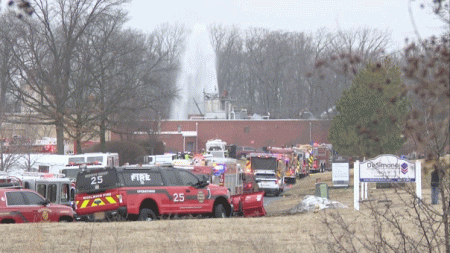The tragic death of Jillian Ludwig, an 18-year-old Belmont University freshman, has prompted a wrongful death lawsuit against multiple entities and individuals, alleging a series of systemic failures that culminated in her being fatally struck by a stray bullet in a Nashville park. Ludwig, a promising musician with a bright future, was jogging in Edgehill Community Memorial Gardens Park when she was caught in crossfire, allegedly intended for another target. The lawsuit contends that the confluence of negligence and recklessness on the part of the defendants directly contributed to the circumstances that led to her death and the delayed medical response that followed.
The defendants named in the lawsuit include the city of Nashville, the state of Tennessee, the Nashville Metro Development and Housing Agency (MDHA), Belmont University, state and city employees involved in the mental health evaluations of the alleged shooter, Shaquille Latrelle Taylor, and a gun supplier who allegedly sold Taylor a firearm. The lawsuit alleges that each of these entities failed in their respective duties to protect Ludwig, leading to the tragic outcome.
Central to the lawsuit are the allegations surrounding the handling of Taylor’s prior criminal history and mental health evaluations. Taylor had a documented history of violence, including previous accusations of shooting a teenager and a pregnant woman. Despite being deemed incompetent to stand trial in a separate case, Taylor was not held in involuntary confinement. The lawsuit argues that the medical professionals involved in his evaluation, specifically Jenny Matthai, Dr. Michael Loftin, and Dr. Mary Jane Wood, exhibited conflicting assessments, allowing Taylor to remain free despite his documented violent tendencies and access to firearms. This alleged failure to adequately address Taylor’s mental state and restrict his access to weapons is a cornerstone of the Ludwig family’s legal argument.
Furthermore, the lawsuit contends that Belmont University failed in its duty to warn students about the potential dangers of the area where Ludwig was jogging. While the university issued security warnings for other areas deemed less dangerous, no such warning was issued for the park, despite its proximity to campus. The lawsuit also implicates the MDHA, the owner of the apartment complex from where Taylor allegedly fired the fatal shot, arguing that the agency had a responsibility to ensure that firearms were not being used on its property.
The lawsuit also highlights the agonizing delay in medical attention received by Ludwig. Despite being shot in broad daylight in a public park, she remained undiscovered and untreated for over an hour. This delay, the lawsuit argues, exacerbated her injuries and ultimately contributed to her death. The family contends that this delayed response represents a critical failure on the part of the city and its emergency services to provide timely assistance.
The Ludwig family’s grief is compounded by their belief that Jillian’s death was entirely preventable. They argue that existing laws, designed to protect the public, ultimately failed to safeguard their daughter from a known violent offender. Their frustration centers on the perceived inadequacies of the legal system in addressing repeat offenders with documented mental health issues and a propensity for violence. This sentiment, expressed by both parents, underscores the core argument of their lawsuit – that systemic failures and negligence allowed a dangerous individual to remain free, leading directly to the tragic loss of their daughter. The family’s advocacy extends beyond the courtroom, leading to the passage of “Jillian’s Law” in Tennessee, legislation designed to address the very loopholes that they believe contributed to their daughter’s death. This law mandates that individuals deemed incompetent to stand trial be housed in appropriate mental health facilities and entered into the National Instant Criminal Background Check System, preventing them from legally purchasing firearms.
In the aftermath of the tragedy, Nashville Mayor Freddie O’Connell expressed his condolences and reiterated the city’s commitment to finding solutions to reduce gun violence. However, the Ludwigs’ lawsuit points to specific failures within city agencies and highlights the need for more than just expressions of sympathy. The family seeks accountability and systemic change to prevent future tragedies, emphasizing that their daughter’s death was not an isolated incident but the result of preventable failures within the legal and mental health systems. Their legal battle aims to expose these failures and secure justice for Jillian while simultaneously advocating for broader reforms to prevent similar tragedies from occurring.
The lawsuit underscores a broader societal concern about gun violence and the intersection of mental health and criminal justice. The Ludwig family’s pursuit of justice aims to hold accountable those they believe are responsible for their daughter’s death and to catalyze meaningful changes in policy and practice. The case raises critical questions about the effectiveness of current laws in protecting innocent citizens from individuals with known violent tendencies and underscores the desperate need for a more comprehensive approach to addressing the complex interplay of mental health, gun control, and public safety. The ongoing legal proceedings will undoubtedly shed light on these critical issues and potentially influence future legislative and policy decisions aimed at preventing future tragedies like the one that claimed the life of Jillian Ludwig.
The defendants, including Belmont University, the MDHA, and the City of Nashville, have largely declined to comment on the pending litigation, citing the ongoing legal process. The Tennessee Department of Disability and Aging, implicated in the lawsuit due to the actions of its employees involved in Taylor’s mental health evaluations, has also not responded to inquiries. The silence from these entities underscores the gravity of the allegations and the potential legal ramifications they face. The Ludwigs’ attorneys have also refrained from public commentary, prioritizing the family’s privacy and the integrity of the legal proceedings.
The case, however, is not just about assigning blame. It also highlights the urgent need for a broader conversation about societal failures that contribute to such tragedies. The Ludwigs’ pursuit of justice is intertwined with their advocacy for legislative change. The passage of “Jillian’s Law” in Tennessee represents a significant step towards addressing the specific legal loophole that allowed Taylor to remain free despite his violent history. This law, a direct result of the Ludwig family’s activism, underscores their determination to transform their grief into meaningful change. Their efforts are a testament to their commitment to ensuring that no other family endures a similar loss due to systemic failures and legislative inadequacies.
The lawsuit, in its comprehensive scope, seeks to hold accountable not only the individual who pulled the trigger but also the various entities and individuals whose alleged negligence created the circumstances that led to Jillian’s death. This comprehensive approach reflects the family’s belief that multiple layers of failure contributed to the tragedy, encompassing issues related to mental health evaluations, gun control, campus safety, and emergency response protocols. Their pursuit of justice is not limited to seeking retribution but extends to demanding systemic changes to prevent future tragedies.
Jillian’s death has resonated deeply within the Belmont University community and beyond. Her memory continues to inspire calls for action to address the root causes of gun violence and to improve mental health services and criminal justice protocols. The lawsuit serves as a stark reminder of the devastating consequences of systemic failures and the urgent need for comprehensive reform to protect innocent lives. The legal proceedings will undoubtedly be closely watched, not only by those directly affected by the tragedy but also by communities across the nation grappling with the complex and intertwined issues of gun violence, mental health, and public safety. The outcome of this case will likely have far-reaching implications for how these issues are addressed in the future.











